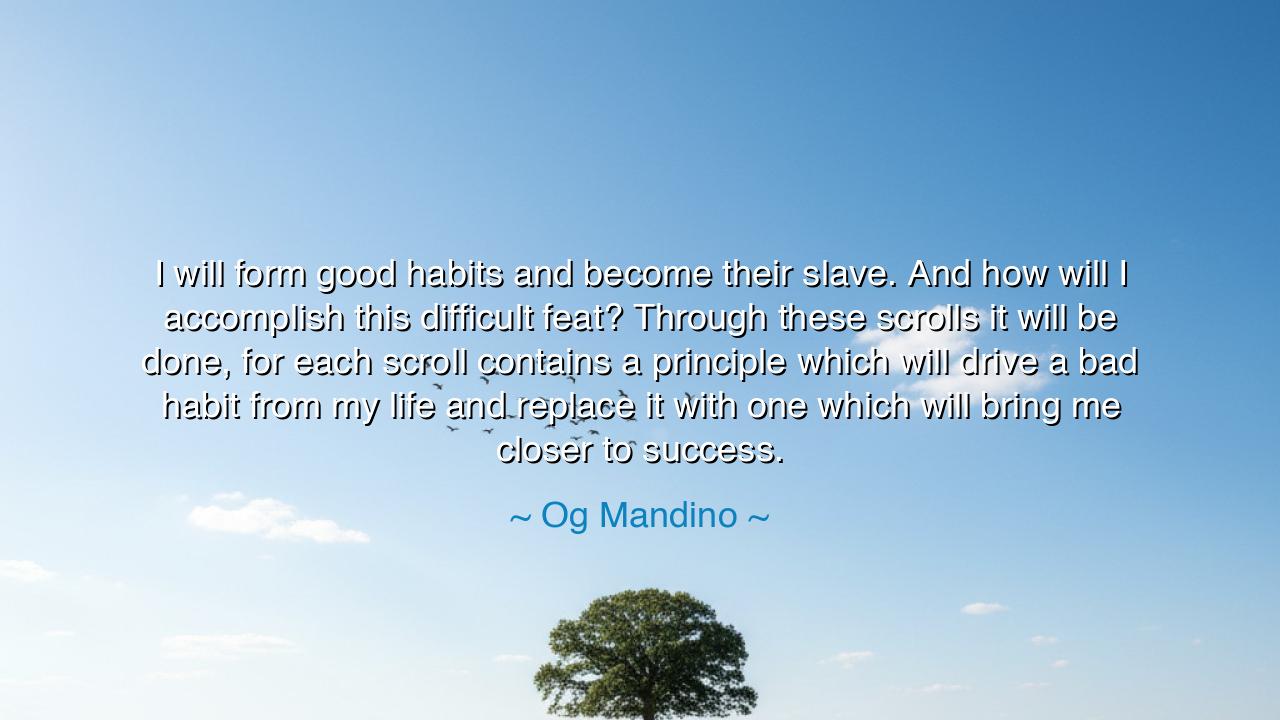
I will form good habits and become their slave. And how will I
I will form good habits and become their slave. And how will I accomplish this difficult feat? Through these scrolls it will be done, for each scroll contains a principle which will drive a bad habit from my life and replace it with one which will bring me closer to success.






"I will form good habits and become their slave. And how will I accomplish this difficult feat? Through these scrolls it will be done, for each scroll contains a principle which will drive a bad habit from my life and replace it with one which will bring me closer to success." Thus proclaimed Og Mandino, and in his words shines the wisdom of the ancients clothed in modern tongue. He speaks of the eternal battle within: the war between destructive patterns and virtuous practices, between the chains of weakness and the discipline that leads to freedom.
The origin of such teaching lies deep in the history of mankind. Long before Mandino, philosophers and sages declared that destiny is not written in the stars but carved into the soul by repeated actions. Aristotle himself proclaimed that “we are what we repeatedly do. Excellence, then, is not an act, but a habit.” Mandino echoes this law of life: that character is the sum of small, daily choices, and that by mastering one’s habits, one masters one’s fate.
The power of his imagery lies in the word slave. At first, it strikes harshly, but in truth it is profound. For all men are slaves—either to their vices or to their virtues. The drunkard is a slave to his bottle, the liar to his false tongue, the idle to his sloth. But blessed is the one who makes himself a slave to courage, discipline, kindness, perseverance. Such a man is not imprisoned, but freed—for he is bound to that which lifts him higher. Mandino calls us not to reject slavery, but to choose our master wisely.
Consider the story of Benjamin Franklin, who as a young man resolved to perfect his character through principles. He carried a small book in which he tracked his progress on virtues such as temperance, humility, and industry. Each day, he measured himself against these ideals, until the practice became second nature. Through this discipline of habit, he rose from obscurity to become one of the founders of a nation, proving that greatness is achieved not by sudden leaps, but by steady steps repeated daily.
The scrolls Mandino speaks of symbolize sacred teachings, timeless truths preserved for the seeker. Each scroll is a guide, a torch to drive away the shadows of bad habits. One may teach persistence, another compassion, another the value of labor. By immersing oneself in such wisdom, the mind is renewed, and the old ways—destructive and corrosive—are cast aside. Just as the ancients studied holy writings each morning and evening, so must we return to guiding words daily, until they shape not just our thoughts but our very instincts.
The meaning of this teaching is both heroic and humbling. It declares that success is not a distant dream, but the inevitable fruit of good habits cultivated with discipline. The man who rises early, labors with focus, speaks truth, treats others with respect, and learns daily cannot help but advance toward his destiny. The road may be long, but every step is a victory, every repeated action a brick in the foundation of greatness.
The lesson is clear: do not wait for inspiration to change you; it is habit that shapes transformation. Choose one principle today and bind yourself to it until it becomes part of your soul. Replace one destructive practice with a constructive one. Guard your thoughts, for they become actions; guard your actions, for they become habits; guard your habits, for they become destiny. This is the law of life, proven across ages.
Practical wisdom calls us: begin your own scrolls. Write down the principles you will live by. Recite them morning and night. Track your progress, not with pride but with resolve. Know that the battle against bad habits is never won in a day, but through patient persistence. And remember always Mandino’s wisdom: in choosing the right habits to enslave yourself to, you will find the path not only to success, but to freedom, joy, and the fulfillment of your true purpose.






AAdministratorAdministrator
Welcome, honored guests. Please leave a comment, we will respond soon